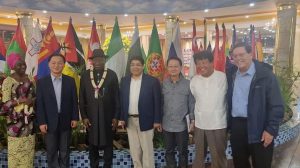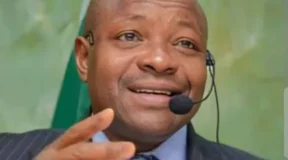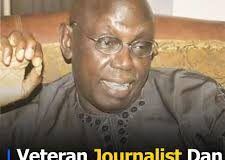Son To Succeed Father
OpenLife Nigeria reports that in Cambodia, a son sis set to succeed father in a widely criticized elections.
Fresh reports indicates that Cambodia’s ruling party led by strongman, Prime Minister Hun Sen, has won 96% of parliamentary seats, unofficial results show, in an election in which walkover has been made possible by the disqualification of the only credible rivals.
Some 8.1 million Cambodians voted on Sunday, July 23 in the tightly controlled national election. Unable to compete, some opposition activists encouraged voters to spoil their ballots, leading to arrests and further threats of legal action from Hun Sen.
Cambodian news outlet, Fresh News, which regularly functions as a government mouthpiece, announced at 11 p.m. that the ruling Cambodian People’s Party had won 120 of the 125 seats in the lower house of parliament, known as the National Assembly, based on preliminary results and information from provincial governors.
The remaining five seats went to the royalist party, Funcinpec, which co-governed the country with the CPP in the 1990s but was ousted by military force by Hun Sen in 1997.
The party largely lost political relevance over the following years, but now finds itself with lawmaker positions again after the country’s main opposition group, the Candlelight Party, was barred in May from contesting the vote.
The Candlelight Party was the successor to the Cambodia National Rescue Party (CNRP), which almost beat the CPP in the 2013 national election when it secured 55 seats after a disputed result.
It has since seen most of its senior members imprisoned or forced into exile, amid a yearslong crackdown on opponents and critics of Hun Sen, who has ruled for 38 years.
The vote comes ahead of a generational shift within the CPP. Prime Minister Hun Sen has vowed, some days ago that, within a month, he will hand power to his eldest son, army commander Gen. Hun Manet, who is a candidate in Phnom Penh.
The Turnout
Some 84% of the 9.7 million registered voters, according to provisional numbers from the National Election Committee released by pro-government media — has become a focus of the CPP, which controls all levers of state power but has sought to present the ballot as legitimate despite the much smaller size of its 17 opponents.
Meanwhile, more official results are due on Monday, July 24 but as of 11 p.m., with 70% of polling stations reporting, the CPP had almost 83% of the vote, followed by Funcinpec with 9%. Spoiled ballots account for 5.6%.
Earlier on Sunday evening, CPP spokesman Sok Eysan claimed the party had “won in a landslide,” although it has acknowledged the final vote tally was not official, reported local outlet CamboJA.
CamboJA also spoke with Funcinpec spokesman Nhoeurn Raden, who called it a “good result” for the party and confirmed it had won five seats.
Going into the election, the CPP held all 125 parliamentary seats because the Candlelight Party’s predecessor, the CNRP, was dissolved by the country’s politically compliant judiciary prior to the previous 2018 national election.
Opposition leader Sam Rainsy, who lives in France, on Sunday shared on Facebook multiple pictures of ballots voided with a large “x” or graffitied with anti-government slogans.
The calls have riled authorities, who arrested four opposition members in response in recent weeks, claiming actions that encourage people to intentionally void their voting slip were unlawful “incitement.”
The crackdown continued on Sunday with Cambodian authorities releasing the names and photos of 40 “rebels” it said were part of a Telegram group that discussed plans to spoil ballots, according to pro-government newspaper the Khmer Times. At least one of the group has been arrested, the newspaper reported.
This appears to be a reference to opposition activist Chao Veasna whose name appeared on the list and whose arrest was reported by CamboJA, which noted Veansa has been previously imprisoned for political activities.
In a voice clip released via his own Telegram account this evening after polls closed, Hun Sen took aim at members of that Telegram channel, named Sabai Sabay, accusing the “extremist” opposition group of founding it to encourage voters to deliberately void their ballots and send photos of the slip to the “leader in Paris”, a reference to Rainsy.

He said authorities knew the faces of those who had joined the group and told them to “not be scared” but “turn themselves in” or “legal measures” would be taken against them, adding they “can’t hide” and urging them not to flee.
“You can come out and confess to the authorities and the National Election Committee … because the movement to destroy ballots is a crime that has to be convicted,” he said.
Hun Sen appeared to suggest the NEC should make a distinction between “normal” invalid votes and ballots spoiled with a cross, in line with calls from opposition members.
“Please, the extremist group” — the opposition — “look clearly and make a clear analysis of the Cambodian people’s political maturity and the strength of Cambodian people in not allowing the scamming and the sabotaging group to destroy the country,” Hun Sen said.
The prime minister also noted the turnout was higher than the 2022 commune election to select local government body representatives, in which the Candlelight Party participated despite its leaders being imprisoned and in exile. He claimed this showed people wanted “happiness, prosperity and peace.”
The NEC’s track record came under scrutiny this month when Human Rights Watch released a report showing “numerous and significant irregularities” in its tallying of results in Phnom Penh during the local election last year. In response, the NEC acknowledged “mistakes” but claimed they didn’t impact the results.
According to information, two people were detained on Sunday, according to local news reports. One refused to stain his finger with the indelible ink that indicates someone has voted and another left the polling station with his ballot slip.
Voters who spoke said they were under no illusions about the competitiveness of the election.
“I don’t believe it is a free and fair election because the opposition party couldn’t compete,” said 46-year-old snack seller Sineng, who asked to only give her first name. “But it is my duty to come to vote.”
She said she voted for the royalist Funcinpec party, which once co-governed the country with the CPP in the 1990s before fading into political irrelevance having failed to capture more than 5% of the electorate in preceding elections.
She said graft, injustice and poverty were among several issues that needed attention from leaders.
“I need the new government to fix the justice system, make sure the poor are treated fairly like the rich, provide better support to people to help them live with dignity, improve the health system and stop the corruption,” she said.
Khun Yan, who voted in his home town of Siem Reap in the north, said he felt an obligation to vote because he was being watched by local authorities.
“I didn’t get to vote for the party I wanted to vote for, because it’s not on the ballot, so I just voted for the party that everyone knows is going to win,” he said. “I have no choice, the village chief is watching you.”
Xi Jinping’s Influence
One country that wants everything to go without a hitch is China. Cambodia is Beijing’s closest friend in the region, often to the dismay of other members of the Association of Southeast Asian Nations. Cambodia has sided with China in ASEAN squabbles over the South China Sea and hosts a not-so-secret Chinese naval base.
When he takes charge, Xi Jinping hopes that strong son Hun Manet will be as reliably pro-China as his strongman dad. If he is, Xi will have his back.
Jonathan In Cambodia
Tested democrat and Nigeria’s former president, Dr. Goodluck Ebele Jonathan who was recently currently in Cambodia in his capacity as a member of the International Advisory Board of European Corporate Council on Africa and Middle East.
He is expected to monitor the Cambodia’s parliamentary elections as well as attend International Leadership and Democracy Summit.
Disclosing this on his Facebook wall, Jonathan who expressed optimism said:
I arrived in Phnom Penh ahead of Cambodia’s parliamentary elections and a scheduled International Leadership and Democracy Summit to a warm reception from Cambodian authorities, the Universal Peace Federation (UPF) and Nigerian Embassy officials.
I thank Secretary of State, H.E. Chum Sounry who led the Cambodian government delegation, Dr. Charles Yang, Chair UPF International, H.E. Folakemi Akinleye, Nigerian ambassador to Phillipines with concurrent accreditation to Cambodia, Ambassador Nasiru Aminu in Ethiopia, Amb. Oma Djeba in Thailand as well as officials from Nigerian embassies in Addis Ababa and Thailand for the amazing courtesies.
I look forward to engaging sessions at the Democracy and Leadership Summit and a successful July 23, 2023 Cambodian elections.
-GEJ
The Country
Cambodia is country on the Indochinese mainland of Southeast Asia and largely a land of plains and great rivers and lies amid important overland with its capital in Phnom Penh.
The country operates a constitutional monarchy with two legislative houses (Senate; National Assembly as its form of government with a population of about 16,493,000 (2023 estimate.}
The ruling party, however, controls all 125 seats in parliament. Opposition parties are banned. Political dissidents are silent, fearful that speaking out against the government might be followed by an unfortunate road accident.








